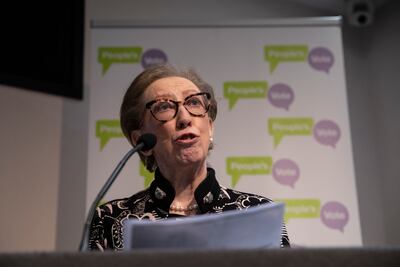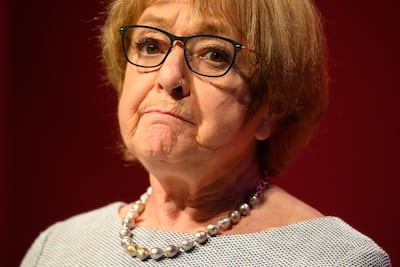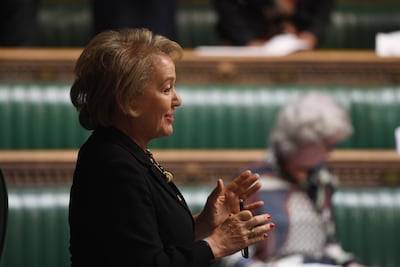When Tony Blair swept into power 25 years ago the deep change in British politics was reflected in the number of female MPs that entered Parliament.
The 101 women made up a quarter of New Labour’s members and helped drive through a raft of reforming legislation.
But of the 1997 intake — referred to as “Blair's babes” by the Daily Mail — four have announced that they will leave Parliament at the next election.
They are among the highest-achieving female MPs in the Labour party. Margaret Beckett was Britain’s first ever female foreign secretary, Harriet Harman served as “acting leader”, and Margaret Hodge earned a reputation for fiercely criticising government excesses as chairwoman of the Public Accounts Committee.
The 1997 intake was a significant step forward, when at a stroke the Labour women helped double the total number of their gender from all parties to 120.
They broke through many barriers in the male-dominated chamber and their success can be measured in the 224 women who now make up a third of all MPs.
Their progress in part is attributed to Mr Blair’s reforming zeal on education and social issues, insisting on women-only shortlists in half of winnable constituencies.
The departure of the four Labour politicians, which comes as 15 Conservatives have announced they are leaving parliament, means that there are just six of the original 101 Blair MPs left in the Commons.
Today, Labour's 102 women make up more than half of its MPs while Tory female MPs make up a just under a quarter — 88 out of 356. However, there has yet to be a female leader of the Labour Party, whereas there have been three female Conservative prime ministers.
The four women leaving parliament have forfeited their chance of changing that, but they have all recorded significant achievements.
Margaret Beckett
Not only was she the first female foreign secretary, and for a short time the first female acting leader of the Labour party, she was also the longest-serving female MP.
Margaret Beckett was first elected in 1974 when there were just 27 female MPs in Parliament.
Despite the “corrosive” nature of modern-day politics being significantly driven by social media commentary, Ms Beckett still believes that young women should go into politics.

“What I felt when I was considering being an MP is I think equally true today,” she told the BBC. “If you think things should be changed and you want to have a say in changing them and you don’t have wealth and power, there’s a very limited number of routes that you can use and this is the biggest of them.”
Ms Beckett, who will be 80 next month, was appointed to the foreign secretary post under Mr Blair in 2006, having previously been environment secretary for five years.
In 1994 she was acting leader for a few months following the sudden death of Labour leader John Smith who was replaced by Mr Blair.
The current Labour leader Keir Starmer described her as a “trailblazer” and a “legend of our party”.
Angela Rayner, the deputy leader, said Ms Beckett had given many years public service “to better politics” and was “an inspiration to us all”.
Harriet Harman
After fighting 10 general elections, serving under seven prime minister and eight Labour leaders, Harriet Harman earned the title of “mother of the house” for being the longest continuously-serving female MP.
She too recently announced her withdrawal from front-line politics, saying that following some difficult years for the Labour party she had renewed faith in its future.
“I feel I can leave the House of Commons now confident that Labour is gaining strength under the leadership of Keir Starmer and the new team he has appointed,” she said in a letter to her London constituents, who she has represented since 1982.

Ms Harman too served as acting Labour leader in 2015, having been deputy leader from 2007 to 2015.
Under Mr Blair she was social security secretary and the first minister for women, as well holding several other Cabinet positions.
When Ms Harman, who is now 71, became an MP 40 years ago she was just one of 11 Labour women members at a time when Parliament was 97 per cent male.
Margaret Hodge
An indomitable and outspoken politician, Margaret Hodge was never one to shy away from speaking truth to power.
As a Jewish woman she felt compelled to call out the anti-Semitism that blighted the Labour party under Jeremy Corbyn’s leadership.
For the last 27 years as an MP she has developed a reputation for vigorous and uncompromising examination of witnesses as chairwoman of the public accounts committee, which scrutinises public spending.

But her proudest achievement was perhaps defeating Nick Griffin, the far-right leader of the British National Party in the 2010 election for the Barking constituency, when she gained 24,000 votes to his 6,000 after he had promised a “political earthquake”.
Since then the 78-year-old has not taken a frontbench post but during Labour’s time in government she has served as a minister in education, culture, and work and pensions departments.
Following her announcement to leave the Commons, Ms Harman described Ms Hodge as an “outstanding local government leader, fierce opponent of fascism and anti-Semitism, scourge of tax evaders, strong sister and forever Labour”.
Ms Hodge said her decision to leave was “really tough” as she had “loved the job”.
Rosie Winterton
A mark of Rosie Winterton’s authority was such that she served as Chief Whip for the Labour party for six years from 2010.
Respect for her authority was further cemented when she was elected Deputy Speaker of the House of Commons in 2017.
During Labour’s time in power, from 1997 to 2010, she held a number of ministerial positions including transport, health and work and pensions.

Ms Winterton also worked hard behind the scenes to secure the right equipment for British soldiers on operations in Iraq and Afghanistan.
Announcing her departure at the next election, the 64-year-old said she would “do my best to support my successor when the time comes”.


